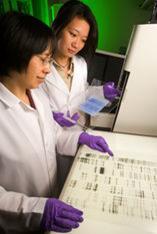
A gene from an orange cauliflower found 30 years ago could hold the key to making food crops more nutritious.
Scientist Li Li (pictured, left) from the US Agricultural Service’s Plant, Soil and Nutrition Laboratory has been using cauliflower to identify genes and define molecular mechanisms that regulate nutrients in plant-based foods.
Li has been using the gene, dubbed ‘Or’ due to its orange colour, to induce high levels of beta-carotene in food crops. The Or gene originates from an orange cauliflower plant found in a Canadian field almost three decades ago.
It is hoped the research could make a significant impact on vitamin A deficiency, as beta-carotene is a carotenoid that the body converts into essential vitamins and uses as antioxidants beneficial to health. Humans convert it to vitamin A.
Importantly, Li said that in cauliflower, the ‘semi dormant gene mutation’ Or promotes high beta-carotene accumulation in various plant tissues that normally do not have carotenoids.
Researchers are looking at understanding how carotenoid synthesis and accumulation are regulated in plants. This, in turn, can lead to strategies for increasing carotenoid content in food crops for improving human nutrition and health, according to Li.